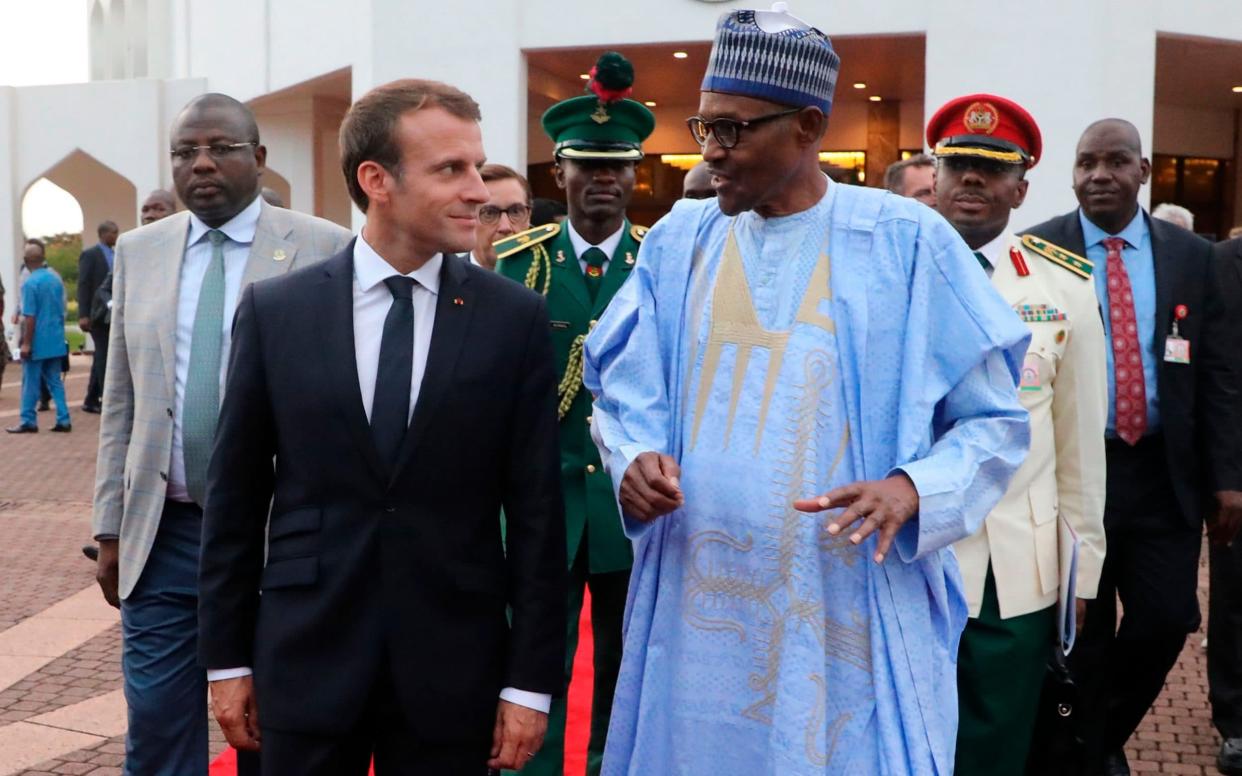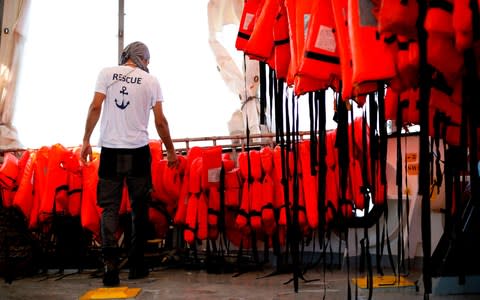Macron says migrant centres will only work if African nations take lead as EU immigration crisis deepens

Emmanuel Macron acknowledged on Wednesday that EU plans to open migrant processing centres in North Africa can only work if the host countries lead the process.
Speaking to the BBC during a visit to Nigeria, the French president said many African countries were concerned that such centres would act as a magnet for greater numbers of migrants.
No African country has so far agreed to host the centres, planned as part of a compromise deal on the migration crisis during a tense EU summit earlier this month.
Mr Macron said the idea “can fly, just if some African countries decide to organise it.” Mr Macron said migration would pose problems for Europe for decades because of unplanned population growth in African countries.
It is a view he has previously expressed, leading to criticism that he is voicing colonial rhetoric.
He was speaking after France agreed to take about 80 migrants from the Aquarius rescue ship that was at the centre of a bitter European dispute over migration last month.

Spain’s government came under growing pressure over its handling of the migration crisis as Barcelona’s mayor called for help over the arrival of busloads of migrants and critics claimed "permissive" policies were creating a magnet effect.
Ada Colau, the mayor of Barcelona, issued an urgent call for resources after 500 migrants arrived in the city by bus in 15 days and an NGO ship docked with 60 rescued people turned away by Italy.
Ms Colau welcomed yesterday’s arrival of the Proactiva Open Arms, granted safe harbour in Barcelona after it was denied permission to dock by Italy’s new populist government.
But she accused Spain’s government of turning a blind eye to the growing problem of migration along its own southern shores, where thousands of arrivals in recent weeks have left reception centres overflowing and forced transfers across the country.
“Let’s be clear, dozens of boats in the form of coaches are arriving with us. And as they arrive by coach, the state does not recognise them and they stay invisible,” Ms Colau told Catalunya Radio.

In June, almost 6,800 migrants arrived in Spain by sea, outstripping the total number of arrivals in Greece, Italy and Malta combined.
The Andalusia regional government has joined calls for a more coordinated European response, cautioning against a "policy of patches".
The Open Arms is the second NGO ship to travel to Spain with migrants rescued in the Central Mediterranean; the first, the Aquarius, was granted safe harbour in Valencia in June after being stranded at sea for days with 629 people on board.
While the move by Pedro Sanchez, the new prime minister, has been largely welcomed, he has also been accused of making political gestures while failing to address fundamental issues.
Yesterday, his government promised an overhaul of asylum processing and air and sea reinforcements for the Spanish coastguard.
Mediterranean migration
But NGOs have warned that with the Spanish asylum system effectively collapsed, far greater resources are needed. Conservatives and anti-immigrant groups have meanwhile accused Spain's new Left-wing government of creating a "calling effect" with its offers of safe harbour.
Vox, a small but vocal hard-Right party, claimed that just as Germany was "closing its borders to illegal immigration", Mr Sanchez's "permissiveness" was causing thousands of migrants to "direct their gazes towards Spain".
The German interior minister is to fly to Vienna Thursday for talks with the Austrian government to defuse a row over his plans to set up transit camps for migrants on the border between the two countries.
Horst Seehofer will meet with Sebastian Kurz, the Austrian chancellor, amid fears the plans could set off a domino effect that could threaten the future of the European Union’s border-free Schengen Area.
Merkel's migration tensions | Read more
“The migration question will decide whether Europe can survive,” Angela Merkel told German MPs on Wednesday as she defended the planned camps.
Mr Seehofer won her backing for the transit centres in a last-minute compromise to avert a German political crisis on Monday after he threatened to resign and pull his Chrisian Social Union party (CSU) out of her coalition government.
But the deal has left him with the difficult task of talking Germany’s reluctant EU allies into accepting the migrants it turns away — after Mrs Merkel failed to persuade them at last week’s EU summit.
Austria reacted furiously to the announcement of the planned transit centres on Tuesday, warning it would impose its own controls on its southern borders with Italy and Slovenia.
Mr Seehofer is also scheduled to hold talks on migrants with Matteo Salvini, the Italian interior minister, on a deal next week.
But he played down hopes for a breakthrough at his talks in Vienna. “It’s about initial talks on how to find an agreement,” his spokesman said.

